A couple of days ago, Timofey Kuznetsov was a guest on Jungleman's 'Winning the Game of Life' podcast.
Timofey and Daniel repeatedly sat together at the highest stakes tables online and live, and it was clearly not the first time they talked heart to heart. So, they started talking without much prelude.
– Hey! Today my guest is a Russian superstar! One of the most dangerous players in history, 'Truteller' Kuznetsov! [parodying a Russian accent] Big money! Big Sirios!
– Hi, how are you? Have you seen the discussion of MTT bots on Twitter? Like, who will have a higher expectation if super-solvers play against people in a mass field? What do you think?
– Well, in a big tournament like the WSOP Main, maybe people would win… Wait, aren't you supposed to be answering the questions here? What do you say yourself?
– I think in ICM spots people will have no chance against bots, at medium or shallow depth. At the final table, the difference in EV for every decision to call or fold is huge. And you won’t get any special reads
– well, the player pushes some kind of range, you can only call or fold. There, people will make a lot of mistakes, especially with calls. So in the late stage, I will always bet on the bot. And in the early stages I’ll bet on myself or on you.

– Are you some kind of math genius? Graduated from the Russian school of the University of Massachusetts, did you win at the olympiads?
– I performed well at the olympiads and defended my degree in probability theory at the Mekhmat of Moscow State University. But in poker, it doesn't really help: in uni you count wildly complex brain-crushing things, and for all the poker math, the 8th grade school curriculum is enough. I calculated that the opponent has 16 combinations of AK – well done.
– I don’t remember a damn thing from my college math class, even though I was good at it too (albeit not like you). Well, if not mathematics, then what? I remember you once said that you know very smart people who have not achieved anything in poker.
– And why do you need a special mind in poker today? All solvers will do it for you. If you are smart, then you will understand faster and deeper than others why solvers play a certain way, okay. But in the end, you need a good memory, the ability to control emotions and concentration. The latter, perhaps, correlates with intelligence, but rather with neuro... What is the word? When are you not quite normal?
– Neurodiversity?
– Yeah. I took an autism spectrum test here and it turned out that I was somewhere in the middle. And I know you have the same story. I think many high stakes players will have the same result, especially the best ones.
– Poker players are generally a bit 'special'. We have a need to follow an alternative path, not the same as everyone else. There aren't many people in the world who are suddenly like, "Hooray, I'm going to play poker professionally now!". Or have you all tried it in your homeland? You're from a small town, right?
– Yes, I grew up near Novosibirsk. At the age of 16 I moved to Moscow. Of course, nobody really played poker around me. My friend started playing online, and soon I did too. But in general, it seems to me that it is quite in the spirit of a Russian person to do things that few people do. Break through, break through your way up.
– Seriously? I thought it was an American thing.
– In general, people in America and Russia are similar. Right now, our countries are on different sides of both the cultural and the real war, but in general our values are much closer than it might seem.
– Interesting! Although, if you think about it, opponents often have a lot in common...
– Attitude towards money, for example. It’s not like that in Europe: you won’t impress anyone there if you buy a fucking Lamborghini and drive around the area in it. In Europe, status is more tied to culture, education, institutions. And in Russia and the United States, status is money.
– Well, yes, in many European countries people are more inclined to just relax and live for their own pleasure. And the Russians always want to sink the gas pedal to the floor and cut everyone's throats. In the United States, people are also often ambitious, striving to break through to the top in order to get all the goodies that are handed out there. In Los Angeles, this is especially evident – in fact, this is one of the reasons why I am here... Okay, enough about me, how did you get into poker?
– I have always been good at games. And I was always sure that I would quickly become rich. And when I saw poker, I thought – well, here you can quickly rise if you try. And in order to try, I had no problems, so it began to work out. Here I must say thanks to Phil Galfond, his videos were very helpful. I was already playing $5/$10, and then I came across some of his old videos, I watch them and think: “Fuck, this guy understands the game deeper than I thought it was possible to understand it.”
– He helped me too. I even remember a particular video that I watched and thought, "Ah, so this is how you play."
– Yeah. And so I play with these guys for $5/$10, I see what they are doing, and I think: “This video by Galfond is already three years old, why haven’t you watched it?”
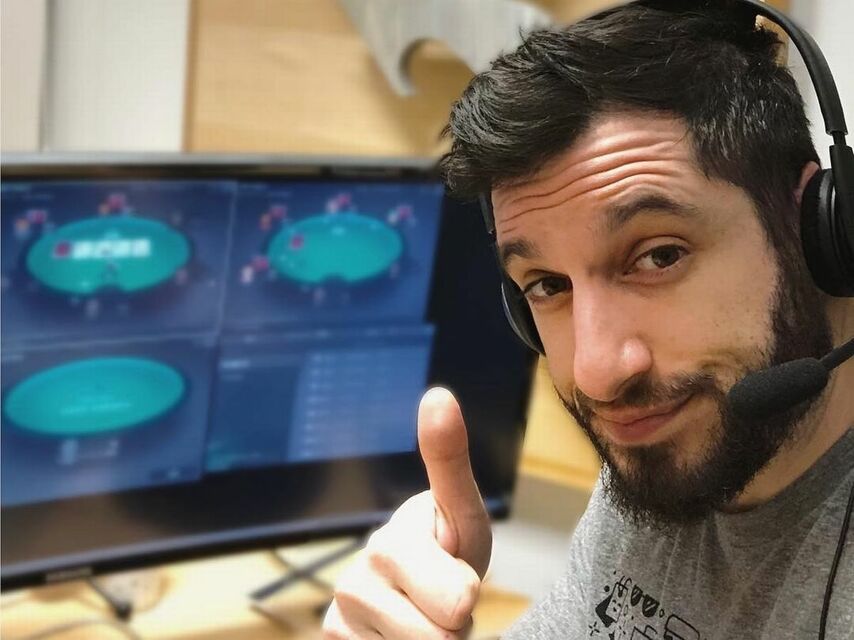
– What qualities helped you to succeed in poker?
– It seems to me that the most necessary quality is, as in music, a sense of rhythm. When you feel the frequencies like you're drowning in the beat. It's a form of intuition to see who is bluffing 15% of the time and who is bluffing 30%. This is very important in poker, and most people won't even notice the difference. You, for example, are also good at this.
– Perhaps. I just never heard anyone compare it to music. I put it this way: I feel when something is wrong in a hand.
– Yes, yes, that’s what I’m getting at. It's just that when I have this feeling, it sounds like a false note in my head. The music plays but it doesn't fit. “This dude has a 150-beat rhythm, he bluffs too much. But that guy hasn't made a sound in the last week, okay, I fold.'' All thoughts are visualized in different ways in my head – for me it’s pictures and music.
– Guys, give up, Trueteller hears when you're bluffing!
– Tell me how you got to the high stakes. You played and played, and no one knew who you were...
– Well, yes, I didn't want people to know who I was. And I got to the high limits quickly. For 9 months – up to $5/$10 and $10/$20. And then I watched Galfond's video – and a week later I was already playing $25/$50, then higher.
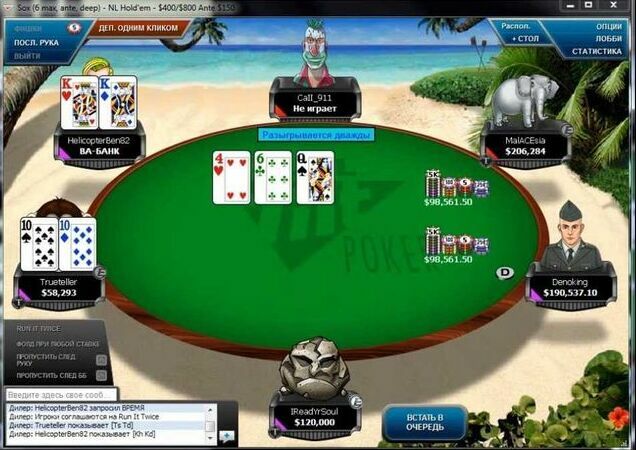
– Even I didn’t get up there that fast!
– Well, at first I played short stack. And then it turned out I quickly became one of the best. People gradually learned, but more slowly. For example, I was defending the BB wide and limping heads-up long before it was fashionable. There were no solvers, but just mathematics helped here: I myself calculated how to protect the BB, it turned out quite accurately.
– You played against Phil Ivey at insane limits, participated in the most expensive games in Macau and Vegas. And I know you've had big failures too. Let's talk about that? Remember when the real big game started? Is this Macau?
– Well, yes. I arrived in Macau when the action at the expensive triple draw disappeared from FTP. We played $2k/$4k, last week I lost two million there, completely on my own. And just a couple of days later, $10/$20 hold'em became the most expensive game live. And I was on hellish tilt – they say, do I need to win a thousand buy-ins now to get out of it? So I ended up in Macau.
– And what, tore everyone there apart?
– No, well, at least not right away. I gave out a lot of tells at first, and played too loosely. I didn't fold the button at all if everyone folded before me. Well, they all played terribly there, and because of this, I also played terribly. Plus I was bored to death, I wasn't used to 25 hands an hour. So it took me a while to get used to it. Luckily, I caught an upswing as soon as I arrived, so I quickly began to enjoy the game. And at the same time I studied mixed-games, because I wanted to beat Ivey – and I knew that he would want to play expensive.
– Picked a great target. Why not learn a new game and challenge the best player in the world to a duel, huh? Nice!
– Yes, he was not in the best shape. I then lived poker, played 16 hours a day. And he just enjoyed life. If I'd had a couple of years of rest and partying around, I would not agree to play online with a 20-year-old guy who grinds for days. I have been preparing for this duel for a whole year, only thinking about it.
– Great lesson. If you relax, Trueteller will definitely appear and beat you from his basement.
– I think the lesson here is that there is only one truly terrible sin both in gambling and in life in general, and that is pride. This applies to me too: when I flew to Macau and saw how they play there, I also began to play like an idiot. And I didn’t even lose, but at first I won much less than I could. Phil is an amazing player. Possibly the most talented. But he certainly became a victim of his own pride.
– In general, do not be like Phil!
— Yes, you shouldn’t get hung up on Phil here, pride is inherent in all poker players. You play $1/$2, they bet you, and you think, they say, he always has only value here. So you think that he is so stupid that you can ideally put him on a specific range? And he is a player of about your level, you sit at the same limit. You end up inventing insane exploits against opponent faces that only exist in your head. First of all, this is terribly disrespectful. And secondly, you yourself will pay for it.
– Everything is like in life.
– Of course, and again – this is a story about me. Do you know the "$500,000 rule" in mixed games in Vegas? If someone lost $500k in a session, they can either remove or add one game? I invented it, because of me it was introduced. When I first came there to play, I did not know about 40 percent of the games. But I like learning new things, it's fun. In the first session, I lost $800k there. But at the same time I realized that this is the most interesting poker imaginable.
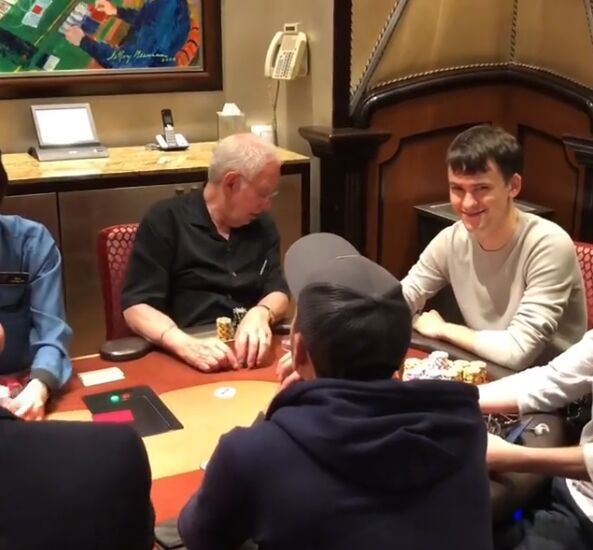
Timofey in Bobby's Room, Bellagio casino, Las Vegas, May 2018
– At some point, you left Macau and began to play in private Asian games. Including with... Damn, I don’t know if his name can be said publicly. In general, you played with very rich people, including one famous amateur who did not allow anyone to sleep. Once I played with him for three days. You were not there then, but I know that you also met him. And I know how much you won. Will these amounts be voiced on the stream?
– Well, yes, millions. They played much bigger than in any TV show. The wildest thing, of course, is that you can’t sleep there. Sometimes you can take a nap for a 50-hour session. I remember how you asked the organizer if you could sleep, and he allowed. And in order not to go far, you just lay down on a nearby poker table and covered yourself with a jacket.
– Yes, it was in London. There was also a rule that you could not leave while the game was going on, unless you were at a huge loss. I remember folding a flush back then, when one of the players had a top set. We had $10 million stacks, and I never saw a big bluff from him.
– Yes, I remember he check-raised on the turn. Bad pass, sure, but I understand why you folded.
– Do you remember any hands?
– Well, yes, of course, I played a lot. But my biggest hand was against you online. In short deck we went straight v set, I won, nothing really interesting. The pot was $5 million, but I didn't have 100% of myself.
– Yes, there are games in Hong Kong that are more expensive! I know one story about you, how you bought 2% from someone. And then I woke up in the morning… [laughs]
– Yeah, I took the phone, looked at the messages and found out that I lost $1.4 million. For 2%. It wasn't the most fun morning.
– I somehow had a share of 6.5%, I received $2 million. By the way, you were in that game, too.
– Yes, they played very expensive, especially when short deck first appeared. And now super-expensive games are running. But many professionals do not stay there – and this is also a story about pride. People feel how you treat them. If you play with businessmen and at the same time you think that they are morons just because they play poker badly ... Well, this is, first of all, stupid – they are just having fun. And secondly, they see it too.
– Yes, I think about that a lot. So you got into such a game, and there is always some chance that you will not be asked back there again anyway. And at the same time, there is a chance that they will call you if they like you. And a lot also depends on yourself: if you act arrogant or play tight, then you are guaranteed not to be there again, in these games they don’t need this. And many professionals have serious faces here. It's not even about how you play – the whole point is how you behave while doing it.
– Yes, but you can't get away from yourself either. If everyone wants you to sing and dance there, and you are a person like me, then even trying is useless, it will not look natural. That is, you can adapt, but you still have to be some version of yourself.
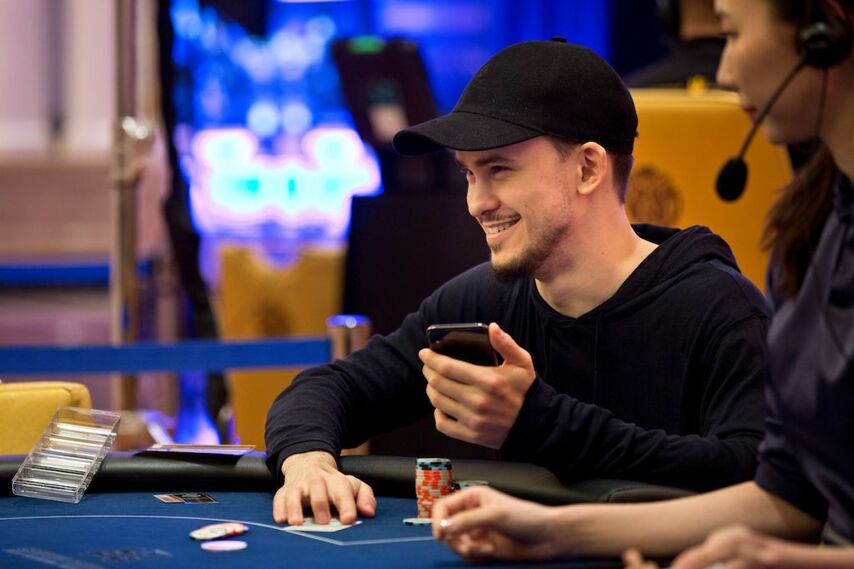
– What else do you want to talk about? About the balance of money, career and life, maybe?
— Listen, well, you are one of the best players in the world, maybe the best. I think the most successful professional gambler. Surely people would be interested to know what you have to say. Surely at some point you began to sacrifice money expectation for the sake of something else?
– Oh sure. When you have enough money for two lives ahead, you just don’t get much pleasure from earnings. But in general, I think the best player in the world right now is Matthew Ashton, not me. Everyone has been playing worse in recent years, including me and you.
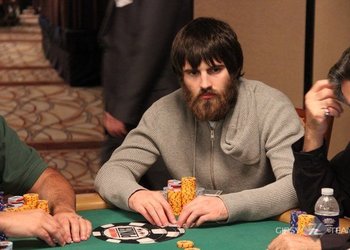
– In limit games, he is probably the best. But if we talk specifically about the career of a professional player, then you will leave everyone behind, including Ashton. You always want something new and never miss your chances. It's not about the technical side of the game, it's about the ability to think deeper than others. Not the search for the maximum EV in specific games, but the search for new areas and opportunities in gambling in general. And here you have no equal. Ashton would never have challenged Ivey to a duel.
– Well, Ashton definitely took less risks. And in my opinion, if you have never lost 30% of your bankroll, then you are doing something wrong. Every time my bankroll was at its peak, I invested 10% as risky as possible. Played with those with whom I wanted to play, in any game. And if the bankroll went down, then I started to select very seriously – I only played tables where I had an edge of 7BB per 100 hands or so. 30% of the bankroll I lost 2 or 3 times. And with this approach, you can gain experience in the toughest lineups. Sometimes it's -EV, but it gives you a lot.
– Yes, I try to approach life the same way. Okay, you're successful in some area, you're rich. But there are other areas, the same self-development. And the podcast is part of my search in these areas.
– Yes, I understand. There are always things where there is room to grow. When you understand yourself, it helps in poker too. For example, I once bluffed too much, and it seemed to me that the main thing was to drown out my fear and play absolutely calmly. But later I realized that emotions can be a clue from the subconscious. Maybe fear is telling you that you are overbluffing. The main thing is not to act under the influence of fear, but it is important to feel it. And outside of poker, sports help me a lot, in the last couple of years I have been doing a lot of boxing. And I would love to fight with someone for some money or just for fun. This is a great challenge.
– Maybe you can fight me?
– Quite! It is only necessary to discuss some conditions.

– I'll probably be a great opponent for you. True, I am fond of kung fu, not boxing. And I never fought, you have more experience here, I guess.
– Well, I haven't fought outside the ring since high school.
– The poker community will probably like the news about our fight.
– Let's discuss!
– We will see! And of the fighters, you love Khabib, right? Did you put money on him?
– I'm not exactly a fan of his, I just thought he would win. He brought me a lot of money. But in general, I like his approach. I also believe that any fight is primarily a fight with yourself.
